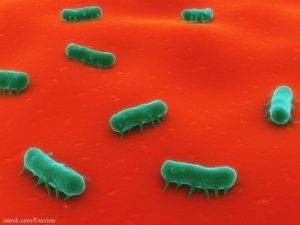There has been another outbreak linked to contaminated cantaloupes. The FDA announced today that 141 people have been sickened with Salmonella Typhimurium in 20 states. Thirty one people have been hospitalized, and two people in Kentucky have died.
 The case count is as follows: Alabama (7), Arkansas (3), California (2), Georgia (1), Illinois (17), Indiana (13), Iowa (7), Kentucky (50), Michigan (6), Minnesota (3), Missouri (9), Mississippi (2), New Jersey (1), North Carolina (3), Ohio (3), Pennsylvania (2), South Carolina (3), Tennessee (6), Texas (1), and Wisconsin (2). Public health officials in Kentucky and Indiana have discovered cantaloupes grown in southwestern Indiana may be the source of the outbreak.
The case count is as follows: Alabama (7), Arkansas (3), California (2), Georgia (1), Illinois (17), Indiana (13), Iowa (7), Kentucky (50), Michigan (6), Minnesota (3), Missouri (9), Mississippi (2), New Jersey (1), North Carolina (3), Ohio (3), Pennsylvania (2), South Carolina (3), Tennessee (6), Texas (1), and Wisconsin (2). Public health officials in Kentucky and Indiana have discovered cantaloupes grown in southwestern Indiana may be the source of the outbreak.
The investigation is in the early stages. A state laboratory in Kentucky matched the DNA of Salmonella found on cantaloupe grown on the Indiana farm to cases of Salmonella food poisoning in Kentucky residents. “This finding is ‘smoking gun’ evidence that cantaloupe from the Indiana farm caused this outbreak,” said Attorney Fred Pritzker.
Anyone who is exhibiting symptoms of Salmonella, including diarrhea, fever, and abdominal cramps, should see their healthcare provider immediately, especially if they have consumed cantaloupe. The illness begins 12 to 72 hours after exposure. People are usually sick for 4 to 7 days.
Children are most likely to get salmonellosis, the disease caused by the Salmonella bacteria. The rate of infections in children under the age of five is higher than the rate in all other groups. But the elderly, those with compromised immune systems, and people with chronic illnesses are also likely to have severe infections. Complications of salmonellosis can include reactive arthritis, also known as Reiter’s syndrome, and heart problems. Fred Pritzker, national food safety attorney who has won millions for food poisoning victims, says “complications and long term consequences of foodborne illness need to be taken into account when we talk about Salmonella poisoning.”
A farm, which has not yet been named, in southwestern Indiana has contacted its distributors, and is withdrawing its cantaloupe from the marketplace. The farm will not distribute any cantaloupe for the remainder of the growing season.
If you have recently purchased cantaloupe, ask your retailer if the cantaloupe was grown in southwestern Indiana. And this is something new: do not try to wash the harmful bacteria off the fruit, since contamination may be on the inside and outside of the cantaloupe. Cutting, slicing, and dicing will transfer harmful bacteria to the fruit’s flesh. Discard the cantaloupe.
If you have questions or concerns about this outbreak, you can call the FDA at 1-888-SAFEFOOD. You can also contact them at FDA.gov.




